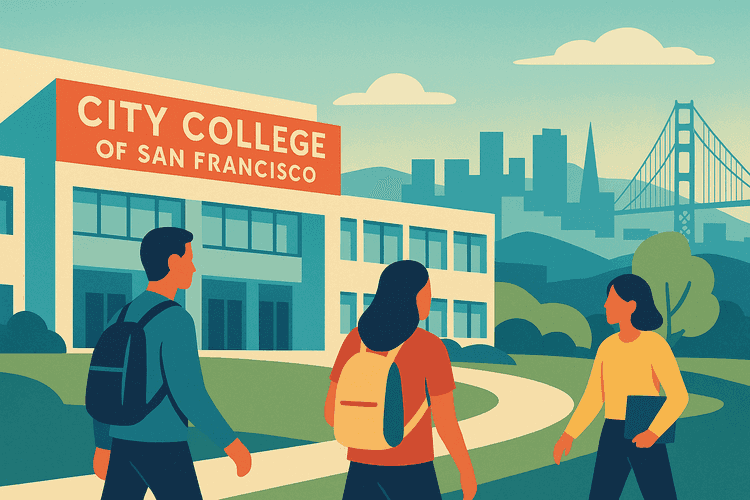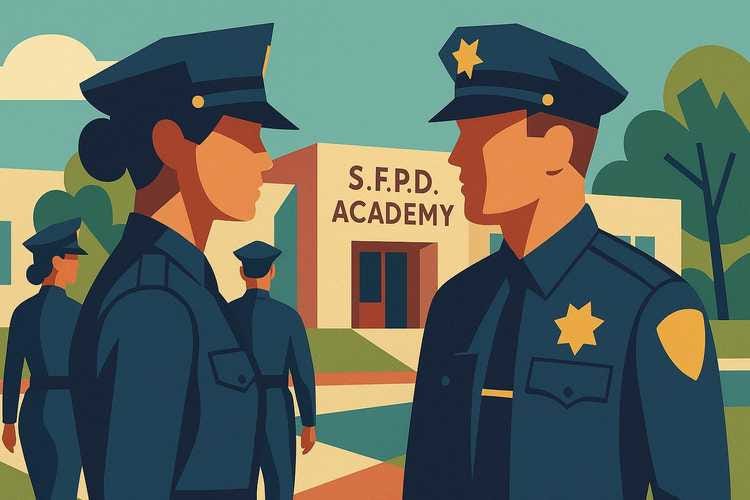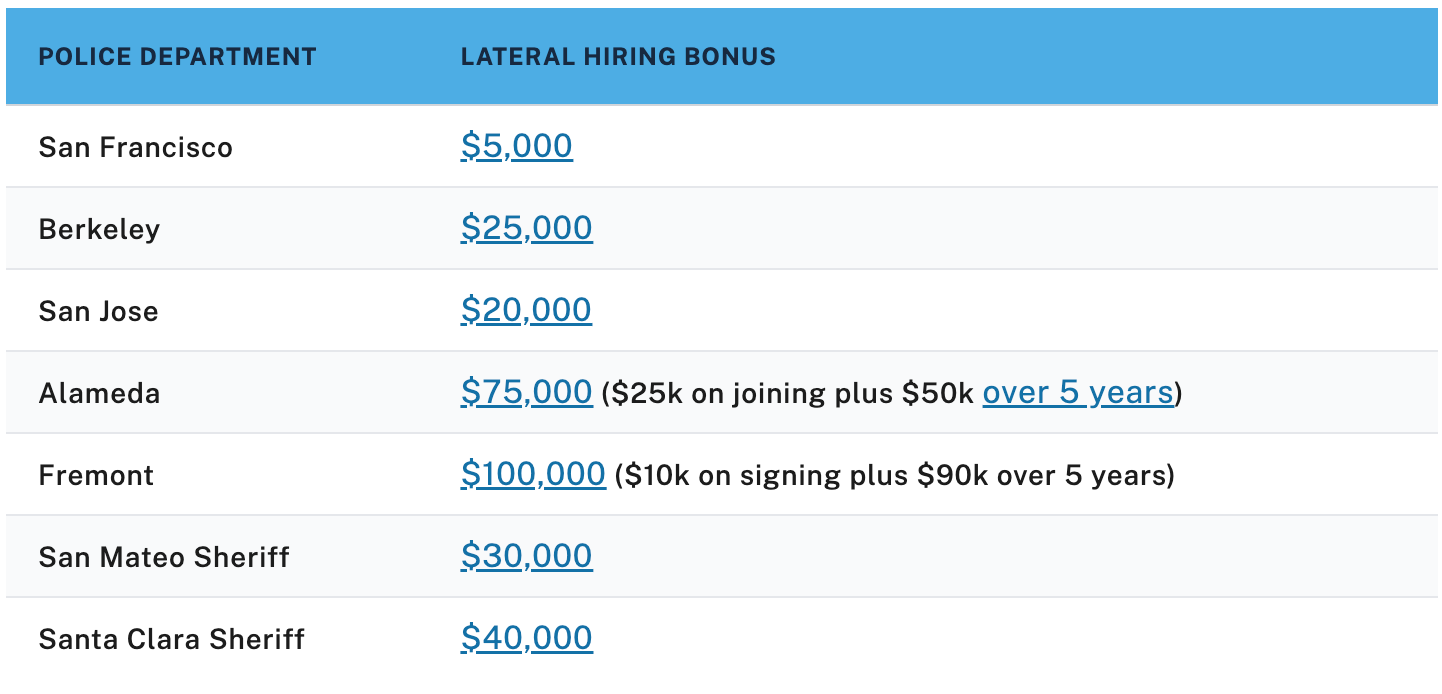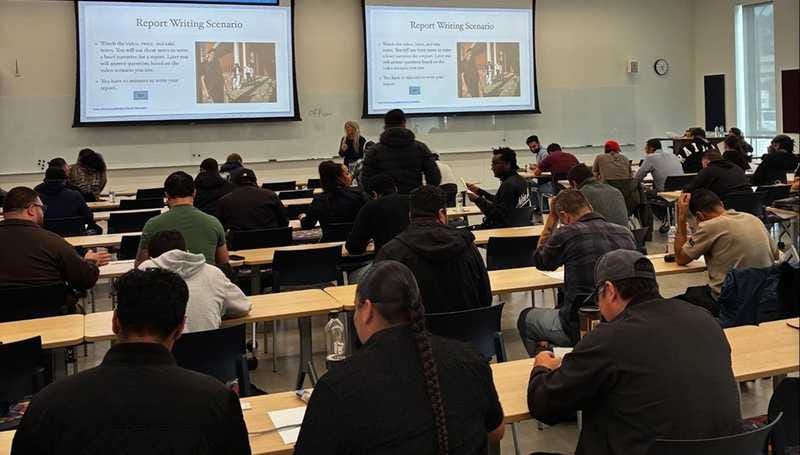Settlement Ends Lawsuit Over SF Homeless Sweeps
PLUS: Why is it so hard to hire a police officer in San Francisco?
What You Need To Know
Here’s what happened around the city for the week of July 20, 2025:
- Settlement Ends Lawsuit Over SF Homeless Sweeps
- City College turns a corner with new leadership
- Grown in SF: Why Notion Chose San Francisco
Research:
- Why is it so hard to hire a police officer in San Francisco?
Settlement Ends Lawsuit Over SF Homeless Sweeps
Published July 25, 2025
SF settles for $2.8 M without changing sweep rules—shelter and storage must come next.
The Facts
San Francisco settled the lawsuit brought by the Coalition on Homelessness that alleged the City's encampment cleaning policies were unlawful. The City will pay $2.8 million, with two formerly homeless individuals receiving $11,000 each and the remainder going to ACLU legal counsel.
Io Yeh Gilman at Mission Local reports that, beyond preserving the 72-hour notice and 90-day storage rule, the city will now mandate enhanced Public Works training, photo-document every sweep, and give the Coalition on Homelessness access to sweep records and the storage yard. If 10 violations occur within 90 days, the Coalition can trigger judicial mediation, with these enforcement rights lasting five years. New minimum notice standards require 48 hours’ written notice for planned sweeps, one hour of oral notice for unplanned actions, and four hours’ written notice before removing unattended items
The Context
In December of 2022, Judge Donna Ryu ordered San Francisco to stop moving people indoors due to a lawsuit brought by the "Coalition on Homelessness" against the city. This ruling left San Francisco with no choices but to leave people in tents and unsanitary living conditions. In June 2024, the Supreme Court ruled in Grants Pass v Johnson that cities could enforce anti-camping (which the Coalition's lawsuit had blocked). Then in August 2024, the Breed administration implemented "aggressive" encampment sweeps.
The City always followed the law by offering shelter to people before clearing encampments, but the Coalition on Homelessness argued that the City was not doing enough to protect people’s belongings during sweeps. The lawsuit claimed that the City violated the Fourth Amendment by destroying personal property without due process.
The GrowSF Take
We hope that this settlement doesn't prevent the City from making more progress on housing people and ensuring our sidewalks are clean. Luckily, it doesn't change the core of San Francisco's encampment sweep policies—the City will continue to enforce its 72-hour notice and 90-day storage rules, which are essential for maintaining public health and safety.
City College turns a corner with new leadership
Published July 25, 2025
After years of turmoil, City College of San Francisco (CCSF) is stabilizing. This summer, CCSF cleared its accreditation warning status, hired a permanent chancellor, and passed a balanced budget, all signs that the college is regaining its footing as a vital institution serving over 42,000 students.
The Facts
City College’s future is looking good for the first time in years. Its accreditation was fully reaffirmed in July 2025, meaning it remains officially recognized as a degree-granting institution eligible for public funding. Without accreditation, students can’t get financial aid and degrees lose their value.
CCSF also hired a permanent chancellor, Dr. Kimberlee S. Messina, after a unanimous board vote. The chancellor is the CEO of the college, responsible for day-to-day operations and long-term strategy. Dr. Messina brings decades of leadership experience from other California community colleges.
And for the first time in years, the college passed a balanced budget. After years of deficits, layoffs, and near-collapse, this signals a serious commitment to financial stability and student success.
The Context
City College is one of San Francisco’s most important public institutions. It offers affordable education, job training, ESL courses, and university transfer programs to tens of thousands of residents—especially working adults, immigrants, and first-generation college students.
But for over a decade, the college has been plagued by financial mismanagement, administrative instability, and governance issues. Enrollment declined, trust eroded, and students were left uncertain.
These recent changes mark a return to credibility and continuity for an institution San Franciscans rely on.
The GrowSF Take
City College is back on track—but it didn’t happen by accident. San Francisco voters elect the Board of Trustees, and last year we helped win reform-minded candidates who are now delivering results. Next year, we have the chance to win a governing majority.
If we want a thriving, stable City College that serves all San Franciscans, we need to keep showing up at the ballot box.
Grown in SF: Why Notion Chose San Francisco
Published July 21, 2025
Since day one, GrowSF has believed the challenges San Francisco faced could be overcome with the love, devotion, and passion of the people who live here.
“San Francisco is one of the rare places in the world where you're rewarded for taking risks.”
-Akshay Kothari, Notion's co-founder and COO
The GrowSF team has wanted to document the spirit of independence and problem-solving we see everywhere in our city. It is core to our culture. It is in our DNA as San Franciscans. It is what we pride ourselves on.
We produced a video with Notion to capture this spirit. Notion makes beautiful interfaces for organizing information. What started as a niche website has grown into a solution for everything from the world’s biggest car companies to the family shopping cart. It now has over 100M users.
We asked Notion why they chose San Francisco and why they are here to stay.
Like Notion, we love this city, and we believe there is nowhere else like it.
Research
Why is it so hard to hire a police officer in San Francisco?
Published July 21, 2025
https://growsf.org/research/2025-07-21-sfpd-hiring/
In 2023, only 1.3% of people who applied to become a San Francisco police officer made it from application to graduation from the academy. Of the 3,008 people who applied, 72 were admitted to the academy, and just 40 graduated.
This is not normal. Thirty years ago, the line to apply to be a San Francisco Police Officer stretched around the block. Thousands applied, SFPD Academy classes were completely full, and hundreds graduated every year. SFPD was fully staffed.
But SFPD isn't alone in its recruitment challenges. Currently, 80% of police departments in America are having issues with recruiting, with some 10-30% facing staffing shortages.
We wanted to find out what could be done to boost recruitment and graduation rates. To get to the bottom of this problem, we researched the department’s hiring process and spoke to decision makers across City Hall, the police academy, and the rank and file. Here’s what we found.
We should hire more cops from other cities
The easiest way to boost SFPD hiring is to invest in our lateral transfer process.
We should continue to recruit and train new officers, but it is much faster and more cost effective to hire police from other cities. While both are ultimately necessary, it’s with laterals that we can obtain the quickest boost to SFPD staffing.
Consider that:
A new recruit has a 2%-5% success rate from application to academy graduation and will be 1.5 years until they start answering emergency calls
A lateral has a 90% success rate from application to becoming a patrol officer on the street, and can start answering emergency calls in as little as 6 weeks (according to the recruitment team)
How do we hire more lateral police officers? We need to increase our signing bonus to be competitive with other Bay Area agencies. Currently, the SFPD lateral hiring bonus is $5,000. We need to increase our lateral signing bonus to at least $20K to be competitive with other departments in our area.
That signing bonus is non-pensionable and can be disbursed over time, like $1,000 per month for 25 months, to ensure that lateral officers remain committed to the San Francisco Police force. It could also be done as an up front lump sum, with a pro-rated payback requirement if they leave early.
Take a look at what other Bay Area Police Departments offer to laterals:
Increase the lateral hiring bonus and within 6 weeks you could have diverse, qualified officers that would have otherwise gone somewhere else.
The 3 stages of a police application
For new recruits, the process to become a police officer has three stages.
Stage 1: The tests
Time to completion: 1 week to 3 months
Recruits must first pass three tests:
Written Tests: Frontline National Law Enforcement Test (NTN) or POST Entry-Level Law Enforcement Test Battery (PELLET-B)
Physical Test: Grip-strength, sit ups, push ups, obstacle course (exam is scored based on number of each physical activity achieved)
Oral Test: Interview in front of a panel with questions about interest and motivation in becoming a police officer, community involvement, problem solving, and communication skills.
Stage 2: Eligibility
Time to completion: Up to 24 months, but the best candidates are fast tracked
Candidates are added to the eligibility list and categorized as green, yellow, or red depending on their performance on the tests in stage 1. Candidates are moved to the next stage in priority order and can stay on the eligibility list for up to 24 months.
Stage 3: Background check
Time to completion: 1 to 3 months
The Background Unit conducts an investigation into who you are, your former employment, your education, and what your family, friends, and neighbors say about you.
During this stage, candidates undergo a drug test, polygraph test, psychological exam, medical exam, vision exam, hearing test, and a review of their court and driving records.
How applicants fail out of the process
Only 2%-5% of applicants successfully make it from submitting their application to graduating from the police academy. Why is that number so low?
One reason is the huge number of no-shows. Many people submit their applications but don't show up to any of the tests. The SFPD recruitment unit believes they can improve this number with a better applicant tracking system (ATS) that can send automated reminders via text message and allow easier follow-up with candidates.
But the failure rate is still high for candidates who do show up. Policing is not an easy job, and some candidates drop out when they realize that it is not the right career path for them. But for everyone else, there are many points along the way where they may fail:
Most applicants fail the written exam
Only 50% of candidates pass the written exam, while 80% of applicants pass the oral and physical tests.
To improve written test passing rates, the recruitment unit offers test prep sessions four times a year. Twice for the Frontline National Law Enforcement Test (NTN) and twice for the POST Entry-Level Law Enforcement Test Battery (PELLET-B). For the NTN, they have a specialized NTN instructor who has agreed to only teach the course with SFPD, despite being asked by multiple departments, including NYPD, to offer her course at their recruitment units.
The SFPD recruitment team shared with us that they would like to offer more test prep sessions, but that their current budget of $250K was not enough to do so. Their budget is already tightly divided between in-person test prep, advertising, and multiple fitness and oral preparation sessions per month.
SFPD background checks are rigorous and few candidates pass
The background investigation is the longest stage of the application process and used to take 6 months to a year.
It was clear from the get go that the background investigation team takes their job very seriously. Background checks are one of the most rigorous stages of the process and involve calling all of the candidate’s references (a list that includes and goes beyond your partner, family, neighbors, and former employers); reviewing their drug, credit, education, and criminal history (anybody with a history of domestic violence is immediately kicked out); and undergoing an 800-900 question psychological test. As one background unit member put it:
> “We’re really strict on backgrounds at SFPD, we don’t want to hire a Derek Chauvin. We will only hire the best.”
> - SFPD Officer
As a former candidate, and now police officer, told us, the background investigations are “legit.” The background investigators show up at your former addresses and interview your neighbors and family members. Candidates are expected to provide information dating back 10 years before the time of application. You can see the background investigation packet that SFPD uses here.
Most common disqualifications
Lying on the application
Drug use
Undisclosed former crimes
Candidates must pass a 900 question psychological exam
The psychological exam is to ensure that you’re emotionally and psychologically prepared for the work ahead of you. The psych exam is made up of an IQ test called the Wonderlic, a 800-900 multiple choice psychological exam, and a polygraph test to evaluate your body’s reaction to stressful situations.
At the end of the background investigation, 2-3 psychologists, a lieutenant, a sergeant, and background investigator sit around a table to make a hiring decision. The candidate is scored and a decision is made collectively whether to give them an offer of employment, which advances them into the police academy. Unfortunately, many candidates fail this step.
SFPD recruiting is getting faster and more successful
Recently, SFPD got a candidate through the whole hiring process in 5 weeks. This was a very motivated candidate, where every one of their references picked up the phone when called. What used to take 6 to 12 months can now be achieved in 5 weeks.
Thanks to a supportive Mayor’s Office and Department of Human Resources, SFPD has seen significant improvements in their hiring process. In particular, these two reforms were key:
SFPD centralized testing so candidates can complete all tests in one weekend
Historically, the first stage of the application process involving the battery of tests would happen on different days and times, as would the prep classes for each test. This process alone could take two to three months. Now, SFPD is hosting testing weekends where a candidate can take all tests over the course of a couple days. Preparation for these tests can take anywhere from a couple weeks to several months depending on the candidate’s physical fitness and test readiness.
SFPD made the background check process more efficient
To speed up the background investigation process, the background unit has started to use investigation software by Guardian Technology. Applicants are coded green / yellow / red based on their battery of tests. For applicants who are green, they are fast tracked into the background checks off the eligibility list right away. Guardian helps centralize all of the background checks in an online database. Until 2024, all background checks were done on paper with investigators writing out all background checks by hand.
The background investigation unit now has 20 full-time civilian staff and software to track the progress of each background investigation. What used to take 6 months now takes between 1 and 3 months.
We have a top of funnel problem
Given the 2%-5% success rate of applicants, SFPD needs to increase the number of qualified candidates that they are getting who are capable of passing the written exams and background investigations. To do that, the SFPD recruitment team needs to be given the budget and software to attract more qualified candidates. Funding should be invested in applicant recruitment strategies that actually source qualified candidates, whether that be college visits or mentorship programs across the Bay Area.
One idea that we’re big fans of is the Law Enforcement Candidate Scholars (LECS) program at Sacramento State University, a university program to prepare current undergraduate students for a career in law enforcement. The program focuses on increasing the diversity of the police force and teaching candidates how to be agents of change in their communities and careers.
How you can help
It is so important that we address the staffing shortage in our Police Department to ensure every San Franciscan has clean and safe streets. We’ve seen estimates of San Francisco having more than 8,000 security guards, which is in no small part because we do not have enough police officers on our streets. A San Francisco where we have a shortage of well trained police officers is a San Francisco that will suffer from a double standard of safety. In such a world, areas that can afford private security will purchase it and those that can’t will experience the fall out that comes from not having a baseline of safety.
From day one, GrowSF has been a vocal supporter of well-trained police officers being a part of our community, to make sure that kids can walk to school safely and no one has to worry about violence where they live, work, and raise a family.
To support SFPD recruitment efforts, support GrowSF’s Invest in the Best Plan.
Support the Invest in the Best Recruitment Plan
Email your supervisor today to support:
Increasing recruitment funding to support more test-prep sessions for police recruits
Increase the lateral hiring bonus so that we can source the best police officers from other departments
A special partnership between SFPD and San Francisco’s Colleges to support the next generation of local police officers
Modernizing the technology that SFPD recruitment runs on to ensure our recruiting process is efficient and effective
Thank you for your support! In the coming weeks, we’ll publish more in-depth pieces on the state of public safety recruiting in San Francisco and how you can help make it more efficient, effective, and accountable.







